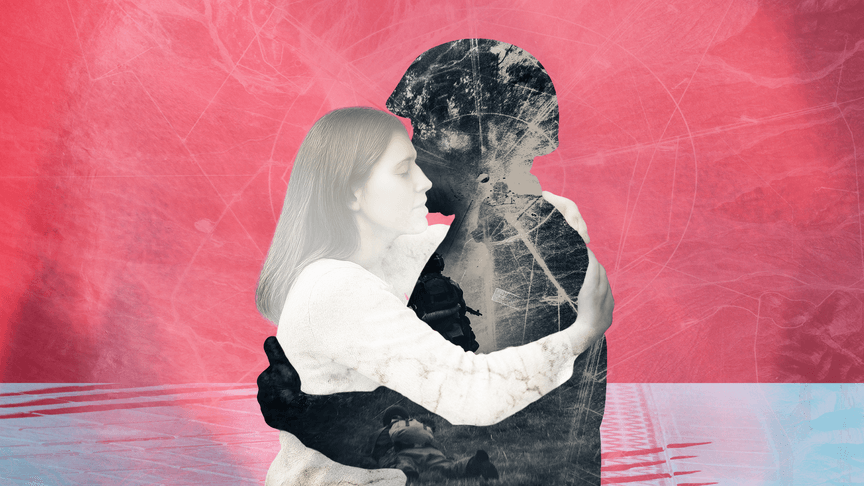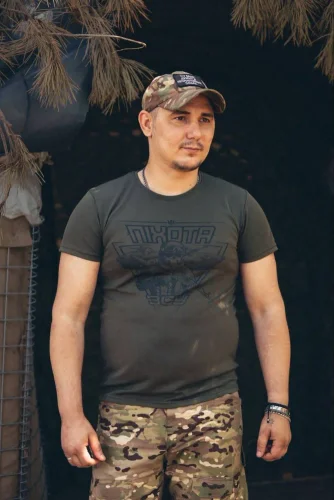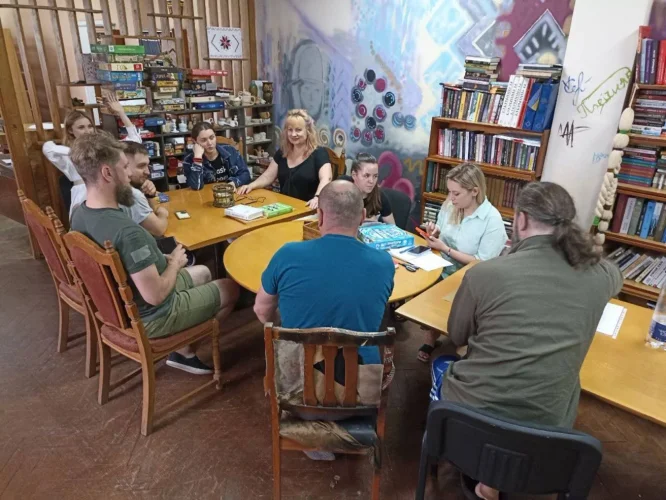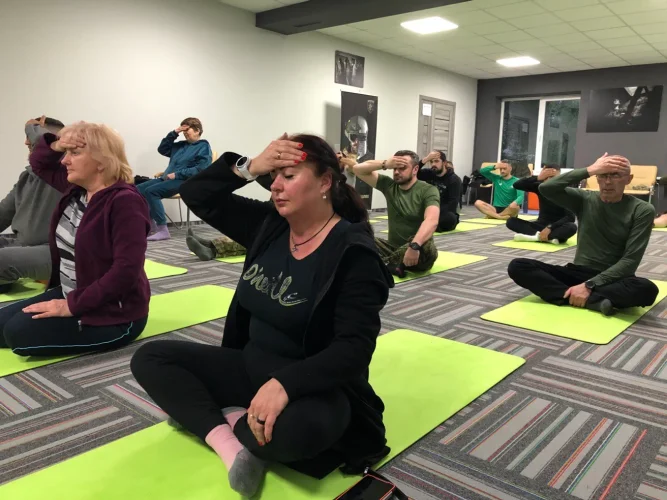“Every service member has concussions nowadays.” How to recognize and help someone with invisible injuries

28-year-old Oleksandr Romenskyi, a veteran of the 57th Brigade, loves recording funny videos, joking about the consequences of his concussion. After suffering a few concussions, he nearly lost his sight and had to learn to walk and talk again. To overcome his stutter, he sings. He started in the car, as it was more comfortable there.
"Yesterday, my friend and I were talking, and we kept forgetting what we were talking about mid-conversation, so we were just cackling, ‘that’s how two people with concussions try to hold a convo.’ I like to joke about it, because only humor can help us to get through trauma without lapsing into navel-gazing and getting depressed. I have extremely poor memory — that's a fact, and unfortunately, there's nothing I can do about it yet! A concussion isn’t an excuse," says the caption under one of his videos. He added that there are many people who are dealing with similar issues and thanked everyone for their patience and understanding.
What is a concussion, why it isn't a precise medical term, what are the consequences and how to treat them, how society can help without harming service members with injuries like this — read in the article by hromadske.
Doctor to doctor: it is important to listen to and hear the patient
Neurologist Ksenia Voznitsyna has been treating this injury for 10 years. She is the head of the Lisova Poliana Mental Health and Rehabilitation Center.
"The term ‘concussion’ can be confusing as it lacks diagnostic precision. It derives from Latin ‘commotio cerebri’, meaning ‘commotion of the brain’, hence the term ‘concussion’. This term is still widely used, but doctors prefer saying ‘mild traumatic brain injury’ (mTBI) because, in addition to concussion itself, there is often trauma to the hearing, vision, and vestibular system. It is induced by the invisible impact of a blast wave.
There is no external damage: neither shrapnel penetrating trauma nor open head injury, says Ksenia. A single exposure to a blast wave is unlikely to have any grave consequences. The body will recover, especially if the conditions are right: quiet and bed rest for the first few days. But when a person suffers 3-5, and sometimes 8-12 mTBIs during their military life, the consequences will be long-lasting."
The neurologist says there can be up to 20 symptoms at once: headache, dizziness, hearing loss, hypersensitivity to light, loud noises, blood pressure fluctuations (from 200 at night to 90 in the morning), and sleep disorders. Physical symptoms are accompanied by emotional and behavioral ones: irritability, aggression, justice sensitivity, and unstable emotional reactions. A person can yell at someone, and two minutes later, they'll be apologizing, “Oh, sorry, I went too far.” At the same time, people can be prone to depression and addiction, as well as suicidal behavior. There are also cognitive symptoms: memory disorder, poor concentration, attention deficit, and slow thought process.
“These can be the symptoms of a hundred other diseases. So, it is very important to listen to and hear the patient. How many explosions happened next to them, what did they feel at that moment and afterwards, and how did this trauma manifest itself in 5 days and a month. In fact, this diagnosis is clinical. There are no laboratory methods for it, and it cannot be detected just by tests. Even an MRI or CT scan won’t show these microscopic changes. It is an invisible injury. That is why we educate medical professionals and have even made an entire course on this. We have been spreading information about this for years. How to treat such people, not just putting IV drips in them, because that is a terrible mistake. It is important to understand that neuroplasticity is the brain's ability to recover and grow new neural connections. And there are no pills or IVs for that. Otherwise, people would be cured from dementia and Alzheimer's, and someone would have already won the Nobel Prize for this invention. It's good that starting this year, we have new protocols for treating such injuries. Finally, psychotherapeutic methods are a priority, not medication.”
To recover, a service member must change their lifestyle: establish a sleep routine and gradually increase physical activity. Even simple tasks such as brushing your teeth with your other hand, showering with your eyes closed, and learning to put things in the same place will help. The neurologist refers to swimming and yoga as “truly cosmic” practices.
In Lisova Poliana, military personnel with mTBIs get help from neurologists, rehabilitation specialists, psychiatrists, and psychologists. The latter can give skills for reducing anxiety and dealing with depressive thoughts. They can help patients to improve family relationships, making it easier for their loved ones to accept such individuals. Service members usually stay at the center for about three weeks, where they acquire the necessary skills. Since Lisova Poliana is affiliated with the Ministry of Health, rehabilitation there is free. However, it’s not easy to get in — there is a waiting list.
Ksenia has a patient who has suffered 12 mild traumatic brain injuries in 10 years.
“He looked horrible at first, but now he looks fantastic because he listens to all our instructions, exercises practically at the frontline (he is fighting), has a psychotherapist, eats right, and quit energy drinks. So, if you take care of your health, you can recover,” says Ksenia.
In addition to training doctors, including general practitioners, the center's specialists share information about mTBIs among the brigades, and they are ready to get on board.
“They set up make-shift hospitals in houses so that the service members can rest in quiet, and sleep for a few days. That's how they recover and go back to fighting.”
What should loved ones and strangers do?
If it’s so difficult for doctors, how can those around service members spot if they have mTBI and help them?
"Loved ones will definitely notice this trauma. They know that the service member spent two years in a war zone. And then they return. They have constant mood swings — one moment they’re aggressive, irritable, and then back to normal in a flash. It’s hard for them to tolerate loud noises, they often wear dark glasses, have headache complaints, and stagger when walking. Frequently, this condition is accompanied by partial or total hearing loss, when, unfortunately, deafness is irreversible. Therefore, it is very important to see a doctor in time and get a hearing aid. And military personnel often hide this condition because they don’t want to seem “old.” It is important to remove this stigma: it is as much a combat injury as the amputation of a limb. No one is against prosthetics. And if hearing loss is left untreated, it can cause mental disorders. The person becomes vulnerable, withdrawn, avoids company, and feels uncomfortable at work,” says Ksenia.
Close ones should pay attention to these symptoms and insist on a visit to specialists. But can a stranger notice that a service member suffers from mTBI?
"It's more complicated. If a person is hard of hearing, if they are dizzy, have a brief loss of consciousness in a stuffy room, or if a serviceperson is holding their head in their hands, or their blood pressure has spiked, or they feel nauseous, an attentive bystander will notice this. Approach carefully, ask quietly, ‘How can I help you? Have you experienced this before? Would you like some water? Do you have any pills with you? Would you like to sit down?’ Just paying some attention will suffice," Voznitsyna is sure.
Battalion commander, “Every service member has concussions nowadays”
33-year-old Mykhailo Vedenko, commander of the 11th battalion of the 59th Assault Brigade, suffered a few mTBIs, he doesn’t know how many exactly. He suffered his first one eight years ago. He still feels the effects: headaches, blood pressure spikes, noise or ringing in his ears. He didn’t receive any special treatment, only IV drips.

"Every service member has concussions nowadays because of the conditions we are in. I know that in a perfect world, they would need time to recover immediately after an explosion, to sleep, and rest for five days in darkness and silence. But this isn’t the case in reality, because no matter how much I wish they had an opportunity to relax, it rarely comes. First, there would be no one left to fight, and second, sometimes it is more dangerous to evacuate a serviceperson from the front line than to let them stay where they are. They can die on the way," he says.
The battalion commander says that his comrades decide on the spot who needs to be hospitalized and who doesn't.
"It's clear that every case is unique. There are different degrees to it. Sometimes a serviceperson would say, ‘I've been concussed,’ when in fact he's just been ‘shaken up’ a bit. My strategy is the following: if I see that my comrade is acting normally, it means they don't need medical help. But once I evacuated a guy who couldn't even find his way around, he couldn't walk. Or if a person is vomiting, bleeding from the ears, unconscious, then it’s hospitalization for sure. A service member with such injuries won’t be able to function, and our comrades would feel safer if I replace him."
In his opinion, strangers are unlikely to spot a service member with a concussion in the crowd. But close ones will definitely notice the consequences.
"This is something you can notice only if you know a person for a while. Chances to spot this condition right away on the streets are low unless the person is behaving completely inadequately. So, I think that if you see a disoriented person, or someone who has a “slowed down” reaction, you can ask what kind of help they need. It doesn't matter whether a serviceperson has a concussion or PTSD, you don't need to know a precise diagnosis. Just treat all military personnel with care and humanity. Each of them gives their all, including the most precious thing they have. So, taking a few minutes to help buy a ticket or in some other way is the least that every civilian can do.”
Leave alone those who don't want help
Psychologist and researcher Olena Borysova believes that people with mTBIs aren’t always able to take care of themselves, as they often lack the energy to do so. Therefore, family members should be involved in their recovery process. And it isn’t just about giving them headache pills, but about helping to organize the treatment process and find good specialists. And they are hard to find.
"Loved ones need to be patient and supportive. They need to be understanding of the different states a service person is in and not demand too much activity, including social events. They need to ask what the person wants and what is best for them. Just being there is already enough.

As for strangers, the perfect option would be offering help to a disoriented person: call a taxi, ask where they came from, where they are going, and where to take them. If their behavior is inappropriate or aggressive, move to a safe distance and call the police and an ambulance. Don't blame yourself for this. If a person is in a state of severe depression and sees everything in dull colors, they need to be rescued, because they may commit suicide.”
Vladislav Kniazev, a neuropsychologist who specializes in the rehabilitation of service members with mTBI, emphasizes that if you are in public, it is necessary to make sure that a service person doesn’t injure themselves and isn’t harming others. If it’s the opposite, wait until the peak of the negative state ends. Then carefully ask if they need help.
“And if they need it, then act. If not, don't force a person to accept your help, don't hover, just go about your business.”
Volunteer Olena Lysenko agrees. She has been caring for wounded service members in military hospitals for 11 years and has seen them after various injuries and conditions.
"These guys often stay at my place (over the years, many of them have become her friends), while travelling somewhere or when they’re going to a doctor. Once, a service member I’ve known since 2016 had been staying at my place for three weeks. He suffered numerous mTBIs and cannot hear in one ear. For a week and a half, he didn’t talk to me. He would go out on business, come back in the evening, eat, and go to his room, locking the doors. I didn’t bother him. I didn't try to talk to him or help him. That’s my position. I'm around guys like this every day. After a while, when he was at home, I gently said to him, ‘Darling, let's go see a psychiatrist,’ because a concussion isn't just about headaches, it's also about depression. He refused, but after three months he agreed. He is now on antidepressants. His mood has improved, he isn’t that withdrawn anymore. He doesn't drink or smoke. That's important," says Olena.
In her experience, a person should be eager to recover. You can't force it. It's not easy, because men often consider themselves invincible and don't admit that they need professional help.
"You can't say that you know better around them: don't give advice, don't pry into their souls. We, as civilians, have no moral right to do so. You have to assess your relationship with them, how well you know them, and very carefully suggest, 'Would you like to see a psychiatrist or psychologist?' Some people prefer individual sessions, others like group therapy. You just have to try. There is no single algorithm for interacting with such military personnel," says the volunteer.

She had experience with families where a husband had mTBI:
"Last year, one service member complained to me that his head hurt, his heart was pounding, and he couldn't sleep. He finally convinced his commander to give him a leave and came to Kyiv: I made appointments with a cardiologist and a psychiatrist. All the doctors were shocked, his test results were terrible. He was prescribed treatment, and two weeks later, he contacted me — his headaches were gone, and he could sleep for 4-5 hours. He was so happy. And then his wife, who lives abroad, called me: ‘I am against my husband being poisoned with pills. He needs to eat properly, get enough sleep, and take homeopathic medicine.’ I lost my temper and told her everything I thought.”
Olena believes that the most important thing is not providing help, but not harming a person with mTBI. If they don’t want to communicate, leave them alone.
“Sometimes people around see someone swaying and think they're drunk or high. The word ‘concussed’ became a synonym of ‘inadequate’. I think this approach needs to be changed, people need to educate themselves, because right now society doesn't know how to behave around military personnel in general, let alone those with injuries like this."
This article was written as part of the Vidnova Lab program, created by Commit gGmbH with financial support from the Robert Bosch Foundation.
- Share:
